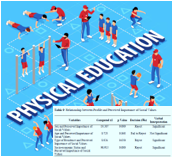Assessing the Significance of Social Values in Pre-Service Physical Education Teachers' Participation in Philippine Traditional Games
DOI:
https://doi.org/10.57260/csdj.2025.268554Keywords:
Social values, Pre-service teachers, Physical education, Philippine traditional games, Teacher participation, Cultural heritageAbstract
physical education teachers when engaging in Philippine traditional games at Batangas State University JPLPC-Malvar Campus during the academic year 2021-2022. Using a descriptive-correlation method, data were gathered from 50 respondents through a researcher-made questionnaire assessing their profile, social values, and perceived importance of these values. The theoretical framework is grounded in situated learning theory by Lave and Wenger and Vygotsky's sociocultural theory, emphasizing the role of social interaction in cognitive development. Results reveal that majority of respondents are female, aged 18-19, residing in urban areas, and belong to lower-income brackets. Community, diversity, well-being, and sustainability were rated as highly important social values. Significant relationships were found between respondents' sex, type of residence, socio-economic status, and their perceived importance of social values. The study highlights the potential of traditional games to foster essential social values and recommends activities such as seminars, team-building exercises, open forums, and sports festivals to enhance these values. These findings emphasize the need for integrating traditional games in physical education curricula to preserve cultural heritage and promote social development, particularly in a post-pandemic educational landscape.
Downloads
References
Brown, J. S., Collins, A., & Duguid, P. (1989). Situated cognition and the culture of learning. Educational Researcher, 18(1), 32-42. Retrieved from https://doi.org/10.3102/0013189X018001032 DOI: https://doi.org/10.3102/0013189X018001032
Dennys, C. D., Arthur, H., & Panji, A. P. N. (2023). Effect of physical activity based on traditional games on the psychological well-being of elementary school children. Jurnal Maenpo: Jurnal Pendidikan Jasmani Kesehatan dan Rekreasi, 13(1), 36-47. Retrieved from https://jurnal.unsur.ac.id/maenpo/article/view/3150 DOI: https://doi.org/10.35194/jm.v13i1.3150
Dhanabhakyam, M., & Sarath, M. (2023). Psychological Wellbeing: Asystematic Literature Review. International Journal of Advanced Research in Science, Communication and Technology, 3(1), 603-607. Retrieved from https://ijarsct.co.in/Feb3i1.html DOI: https://doi.org/10.48175/IJARSCT-8345
Dhani, A. Z., Silvy, J., Sumbara, H., Sutiswo, S., & Ruslan, R. (2022). Traditional Games for Establishing Respect Attitude. Halaman Olahraga Nusantara, 5(2), 702-702. Retrieved from https://jurnal.univpgri-palembang.ac.id/index.php/hon/article/view/7966 DOI: https://doi.org/10.31851/hon.v5i2.7966
Jem, C., & Tanucan, M. (2023). The Difficulties of Teaching Traditional Filipino Games Online. International Journal of Learning, Teaching and Educational Research, 22(3), 108-127. Retrieved from https://ijlter.org/index.php/ijlter/article/view/6546 DOI: https://doi.org/10.26803/ijlter.22.3.7
Joseph, L. (2023). Protecting Philippine Dance Traditions via Education of Tomorrow's Pedagogues: The Role of Individual Interest and School Engagement. Journal of ethnic and cultural studies, 10(1), 98-124. Retrieved from https://www.ejecs.org/index.php/JECS/article/view/1527 DOI: https://doi.org/10.29333/ejecs/1527
Lave, J., & Wenger, E. (1991). Situated learning: Legitimate peripheral participation. Cambridge University Press. Retrieved from https://doi.org/10.1017/CBO9780511815355 DOI: https://doi.org/10.1017/CBO9780511815355
Michelle, A. T., Christine, H. A., Marie-Christine, D., Karen, M., Shraddha, K., & Tara, R. (2023). Pandemic Pedagogy: Educators' Practices During the Covid-19 Pandemic. Advances in research on teaching. Emerald Publishing Limited. Retrieved from https://www.doi.org/10.1108/s1479-368720230000041015
Nozomu, T. (2022). A reflection of life - my tale of microdiversity, equity and inclusion in cell biology (and beyond). Journal of Cell Science, 135(8), 1-3. Retrieved from https://www.doi.org/10.1242/jcs.260018 DOI: https://doi.org/10.1242/jcs.260018
Rizzalyn, R. A., & Edilberto, Z. A. (2023). Integrating Indigenous Game-Based Activity in Promoting Interactive Learning Development among Grade 10 Students. International Joirnal of Social Science Humanity & Management Research, 2(6), 347-350. Retrieved from https://ijsshmr.com/v2i6/9.php DOI: https://doi.org/10.58806/ijsshmr.2023.v2i6n09
Vygotsky, L. S. (1978). Mind in society: The development of higher psychological processes. Harvard University Press. Retrieved from https://www.jstor.org/stable/j.ctvjf9vz4
Yernar, O., Aziya, Z., & Saniya, N. (2023). The impact of folk games on primary school students. Journal of education and e-learning research, 10(2), 125-131. Retrieved from https://asianonlinejournals.com/index.php/JEELR/article/view/4473 DOI: https://doi.org/10.20448/jeelr.v10i2.4473

Downloads
Published
How to Cite
Issue
Section
Categories
License
Copyright (c) 2025 Community and Social Development Journal

This work is licensed under a Creative Commons Attribution-NonCommercial-NoDerivatives 4.0 International License.
1. Articles, information, content, images, etc published in the “Community and Social Development Journal” are copyrighted by the Community and Social Development Journal, Chiang Mai Rajabhat University. In order to properly distribute the articles through print and electronic media, the authors still hold the copyright for the published articles under the Creative Commons Attribution (CC BY) license, which allows the re-distribution of the articles in other sources. References must be made to the articles in the journal. The authors are responsible for requesting permission to reproduce copyrighted content from other sources.
2. The content of the articles appearing in the journal is the direct responsibility of the article authors. The editorial board of the journal does not necessarily agree with or share any responsibility.













